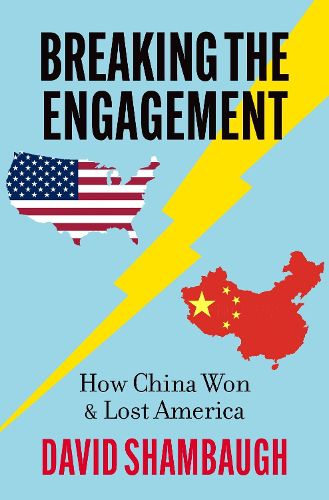Readings Newsletter
Become a Readings Member to make your shopping experience even easier.
Sign in or sign up for free!
You’re not far away from qualifying for FREE standard shipping within Australia
You’ve qualified for FREE standard shipping within Australia
The cart is loading…






An internationally recognized scholar provides a powerful explanation of the Breaking the Engagement: How China Won & Lost America between the United States and China. For over five decades following the 1972 rapprochement between the United States and China, the two countries seemed to be steadily building a sound relationship, even accounting for periodic setbacks like the Tiananmen Square massacre. The last decade, though, has seen a sharp increase in tensions and a complete reorientation of American policies toward ChinaDLfrom "engagement" to "competition." What happened? In Breaking the Engagement: How China Won & Lost America, esteemed scholar David Shambaugh examines the evolution, expansion, and disintegration of the American engagement strategy towards China. Shambaugh attributes the recent sharp deterioration of relations to a combination of China's actions and American expectations. Xi Jinping's increasingly assertive foreign policy and domestic repression has directly challenged American interests. More deeply, he argues that the real underlying cause is America's longstanding paternalistic approach to transform China into a liberal state and society which conforms with the US-led global liberal order. When China has generally evolved in this directionDL politically, economically, socially, intellectually, and internationallyDLit corresponds with American aspirations and the two could cooperate. But when Beijing pushes back against this transformative strategyDLwhich Beijing sees as subversionDLAmericans become disillusioned and U.S. policymakers see China as a malign regime, which must be countered. By focusing on the role of perceptions and U.S. expectations in fueling the shift towards competition and rivalry in the last decade, Shambaugh provides a unique new perspective on this critical global relationship.
$9.00 standard shipping within Australia
FREE standard shipping within Australia for orders over $100.00
Express & International shipping calculated at checkout
An internationally recognized scholar provides a powerful explanation of the Breaking the Engagement: How China Won & Lost America between the United States and China. For over five decades following the 1972 rapprochement between the United States and China, the two countries seemed to be steadily building a sound relationship, even accounting for periodic setbacks like the Tiananmen Square massacre. The last decade, though, has seen a sharp increase in tensions and a complete reorientation of American policies toward ChinaDLfrom "engagement" to "competition." What happened? In Breaking the Engagement: How China Won & Lost America, esteemed scholar David Shambaugh examines the evolution, expansion, and disintegration of the American engagement strategy towards China. Shambaugh attributes the recent sharp deterioration of relations to a combination of China's actions and American expectations. Xi Jinping's increasingly assertive foreign policy and domestic repression has directly challenged American interests. More deeply, he argues that the real underlying cause is America's longstanding paternalistic approach to transform China into a liberal state and society which conforms with the US-led global liberal order. When China has generally evolved in this directionDL politically, economically, socially, intellectually, and internationallyDLit corresponds with American aspirations and the two could cooperate. But when Beijing pushes back against this transformative strategyDLwhich Beijing sees as subversionDLAmericans become disillusioned and U.S. policymakers see China as a malign regime, which must be countered. By focusing on the role of perceptions and U.S. expectations in fueling the shift towards competition and rivalry in the last decade, Shambaugh provides a unique new perspective on this critical global relationship.